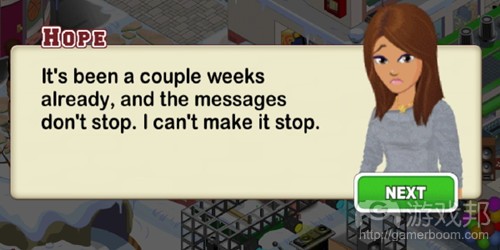游戏如何为网络暴力牺牲者提供帮助
作者:Jude Ower
在游戏产业中,为善游戏正不断壮大着。
在过去的12个月里,像艺电,Rovio,Miniclip以及Jagex等公司便致力于支持个不同的全球慈善事业。甚至像Yogscast,PewDiePie以及Athene等YouTube名人也一直支持着善举。
对于名人或媒体支持慈善事业并不是什么新鲜事。多亏了快速发展的游戏产业,如今的游戏似乎也在向此靠近。对于开发者来说,真正的USP(游戏邦注:独特的卖点)是:游戏能够讲述故事。
作为玩家,我们会基于个人方式与游戏故事进行互动。我们会将其表现出来,并沉浸于内容中,并通过点击按键而接受游戏能够将我们从一个地方带到另一个地方的能力。
而本身拥有许多可讲述的故事的慈善事业总是能够吸引来自四面八方的支持。如果我们能够将现实世界对于帮助的需求与游戏相结合会怎样?
打击网络暴力
有许多值得我们分析的例子存在,但对于我来说最特别的应该是Pixelberry Studios的《High School Story》。
在2013年10月,Pixelberry的开发团队接触了一个遭受到网络暴力并且不知道该向谁寻求帮助的玩家。于是为了帮助青少年们,该开发团队为年轻人们开通了一条服务热线并提供给他们一些专业的建议。他们也因此想到:到底有多少《High School Story》的年轻玩家正遭受着同样的问题且不知道该怎么做?
于是他们便将网络暴力调查整合到《High School Story》中以帮助唤醒人们的意识并为慈善机构Cybersmile提供支持且凑集资金。Pixelberry得到了组织的支持以确保其调查足够精准。
最后该团队还添加了一种特别的慈善捆绑销售,即使用虚拟货币进行购买,以此提供给玩家一枚装饰旗让他们在游戏中表现出自己对于该活动的支持。
很快地《High School Story》玩家便聚集在了一起。根据Cybersmile,他们每周大概会接到100个新电话,并且从活动开始以来已经接到了大概3000个年轻人的帮助请求。
那些需要帮助人的被带到了Cybersmile,并且能够在那里得到专家的帮忙。该活动共筹集到超过32万美元去支持这个24小时服务热线。
活动后,Pixelberry收到了来自一名《High School Story》玩家的父母的一封感人的信件。那位母亲讲述了自己的女儿在遭遇了网络暴力后有多消沉,并且也不知道该请求谁的帮助。后来她通过《High School Story》知道了Cybersmile,并且得到了自己想要的帮助。在信件最后她甚至说道:“谢谢你救了我的女儿。”
这个世界,特别是媒体应该将游戏当成一种为善力量并开始相信游戏所能带来的帮助,而不是害处。游戏能够拯救比我们想象中还多的生命,而这一切也仍然只是一些表面的成就。
(本文为游戏邦/gamerboom.com编译,拒绝任何不保留版权的转发,如需转载请联系:游戏邦)
How games can help support victims of cyberbullying
By Jude Ower
Gaming for good has become a growing area of interest within the industry.
In the past 12 months, firms such as EA, Rovio, Miniclip and Jagex have taken it upon themselves to support varying global charities. Even YouTube celebs such as Yogscast, PewDiePie and Athene have been supporting causes close to their hearts.
It is not a revolutionary phenomena to see celebrities and media support charities. Thanks to the rapid growth of the industry, gaming logically seems to be the next sector to embrace this. For developers, the real USP is this: Games tell stories.
As players, we interact with these in a very personal way. We enable them, act them out, lose ourselves in their content, and fully embrace their ability to transport us from one locale to another with the click of a button.
Charities themselves have incredible stories to tell that can attract huge support from far and wide. What if we combine the power of real world calls for help with games?
BEATING THE BULLIES
There are so many great examples to talk about, but one in particular stands out for me: High School Story by Pixelberry Studios.
In October 2013, the team at Pixelberry had been contacted by a player who was distressed about being cyberbullied and not sure where to go for help. Concerned for the welfare of the teenager, the devs found a helpline for the young person to get expert advice. This made them think: how many other young people playing High School Story are suffering with the same issues and don’t know what to do?
A cyberbullying quest was integrated into High School Story helping to raise awareness, provide support and raise money for a particular charity: Cybersmile. Pixelberry enlisted the organisation’s support to ensure the content within the quest was accurate.
Finally, the team added a special charity bundle, purchased with virtual currency, and a decorative flag to allow players to show their support within the game for this cause.
Instantly, High School Story players flocked to the quest and bundle. Cybersmile recorded a spike of 100 new calls per week and around 3,000 new young people called for support.
Those who needed support were directed to Cybersmile where they could talk to an expert. By the end of the campaign, over $320,000 was raised to support the 24-hour helpline they have running.
Following the campaign, Pixelberry received a heart-warming letter from a parent of a High School Story player. The mother told of how her daughter had been left distraught after being bullied online and didn’t know who to turn to. She discovered Cybersmile through High School Story and then found the courage to reach out and gain the support she needed. The exact sign off on the email was: “Thank you for saving my daughter”.
The world, and especially the media, must see games as a force for good and start to focus on how games can help instead of harm. Games can save more lives than we can ever imagine and this is just scratching the surface.(source:develop-online)








































 闽公网安备35020302001549号
闽公网安备35020302001549号